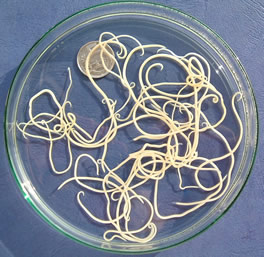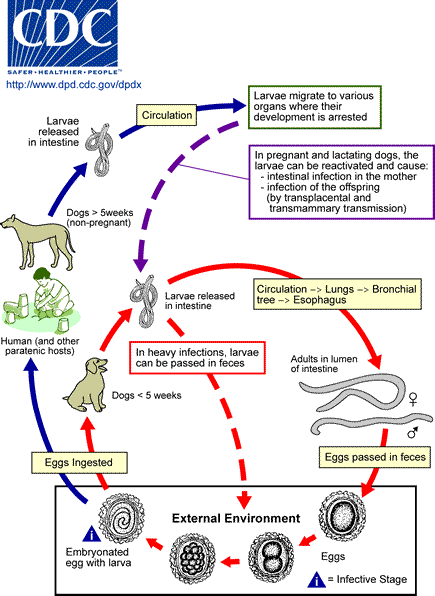Roundworms 
Roundworms, also known as ascarids, are another parasite that lives inside and feed off an animal’s intestines. They’re usually white or light brown and a few inches long. (They look like spaghetti.) If your dog has roundworms, you may notice them in his poop or vomit.
Obviously any worm is a bad thing and there is nothing particularly unusual about roundworms. Almost all puppies are born with them - they get them from their mother or in her milk. In essence, roundworms are small worms that have a body that is rounded. Usually, they are somewhere between 3-5 inches in length and they dwell in the intestines of a dog, eating food that has been somewhat digested. While they don't stick to the intestine, they do move around in the food and the eggs are passed into the stool of the dog.
Any dog can get infected with roundworms if they happen to ingested any roundworm eggs. Once they eat the eggs, the worms hatch in their bodies and ultimately make their way to the intestines of the dog. There are other animals that can harbor these roundworms and pass them on to dogs, including cockroaches, rodents, chickens and earthworms.
Symptoms of Roundworms
Some dogs don’t show symptoms of being infected, but many do. Often in puppies they will have a pot-belly appearance. Here’s what to look for:
- Pot-belly
- Weakness
- Diarrhea
- Vomiting
- Belly pain
- Dull coat
- Weight loss
- Roundworms in poop or vomit
Treating Roundworms
There are many safe and effective deworming drugs. They include fenbendazole, milbemycin, moxidectin, nitroscanate, piperazine, and pyrantel - some have even found success in using d-earth for mild infestations. Your vet will give your dog one to three doses at first, which will kill the adult worms. Your dog will get follow-up doses to kill any new worms that weren’t fully developed when the first doses were given. Because it’s so common in puppies, breeders typically deworm pups when they’re 2-3 weeks old just to be safe. After your dog is treated, he should get regular fecal exams. For puppies, that’s two to four times a year. For dogs 1 year or older, it’s one to two times a year is enough.
Fortunately, it is relatively simple to eliminate roundworms in dogs. There are a variety of good drugs that are available that can be used to help kill the roundworms, and they are usually effective and safe for your dog. Most of the drugs work by paralyzing the worms so they can be passed out of the dog in their stool. It will take at least two or three doses to completely get rid of the roundworms and it is advisable to do these treatments with a few weeks in between them.
Preventing Roundworms
While treating roundworms is possible, it's better to prevent your dog from getting roundworms in the first place (not always possible with newborn puppies). . Your dog can avoid getting roundworms by following these tips:
Confirm that mothers are dewormed later in their pregnancy so that the worms are not passed on to their puppies.
- When your puppies are 2-3 weeks old you should deworm them
- Continue to deworm the dog on a regular basis with quality products (do NOT use Hartz Mountain...they have killed many dogs!)
- Anytime that you discover any type of worm problem, treat immediately.
- Pick up dog feces as soon as possible - whether they are in your yard, at a park, or in a playground
- Give your dog some d-earth (a tablespoon or so) with his meals



